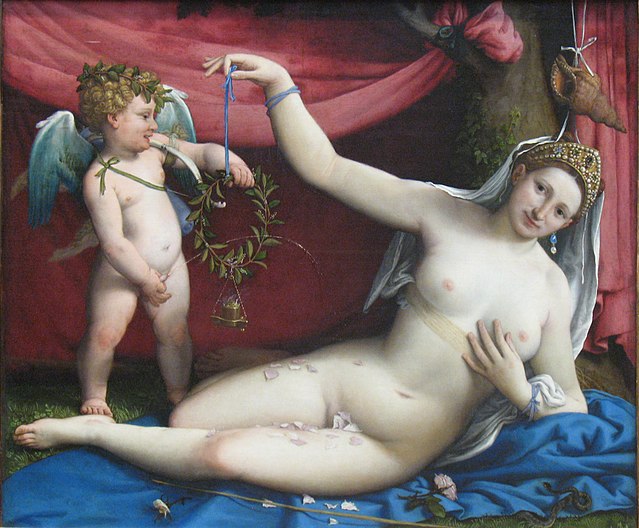Hymen, Hymenaios or Hymenaeus, in Hellenistic religion, is a god of marriage ceremonies who inspires feasts and song. Related to the god's name, a hymenaios is a genre of Greek lyric poetry that was sung during the procession of the bride to the groom's house in which the god is addressed, in contrast to the Epithalamium, which is sung at the nuptial threshold. He is one of the winged love gods, the Erotes.
Hymen depicted on a Roman mosaic, Ostia Antica
Nicolas Poussin, Hymenaios Disguised as a Woman During an Offering to Priapus, 1634, São Paulo Museum of Art
Cupid standing (left), and Hymen sitting (right). Hymen's burning torch on a Napoleonic wedding medal of 1807. It commemorates the marriage of Napoleon's youngest brother Jérôme Bonaparte to Princess Catharina of Württemberg at Fontainebleau.
Cupid Rekindling the Torch of Hymen, a sculpture by George Rennie
An epithalamium is a poem written specifically for the bride on the way to her marital chamber. This form continued in popularity through the history of the classical world; the Roman poet Catullus wrote a famous epithalamium, which was translated from or at least inspired by a now-lost work of Sappho. According to Origen, the Song of Songs might be an epithalamium on the marriage of Solomon with the Pharaoh's daughter.
Marlianus Mediolanensis Ioannes Franciscus Epithalamium in nuptiis Blancae Mariae Sfortiae et Iohannis Corvini
Titlepage of In Nuptias illustrium Joan. de Zamoscio, by Jan Kochanowski, Cracow, 1583
Venus and Cupid, Lorenzo Lotto, 1530, Metropolitan Museum of Art







